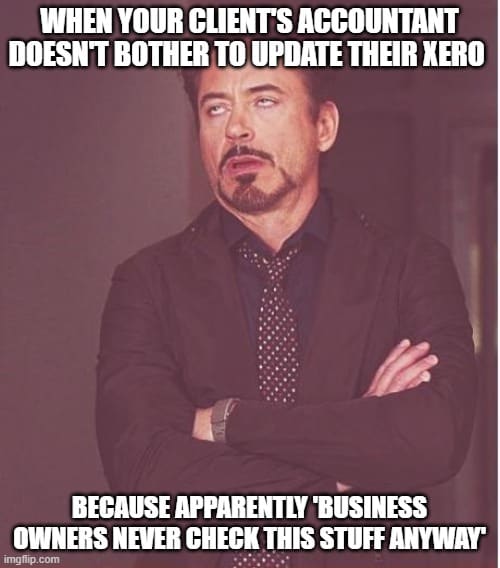Have you ever felt like you're drowning in a sea of numbers, struggling to make sense of your business's financial reports? Do you wish your accountant had more time to guide you through the basics of understanding your own financial data (but there never seems to be the space in your meetings)?
You're not alone.
I've heard this frustration time and time again from business owners like you. But have no fear, Liz is here! 😉
Business ownership is one of those funny things - much like parenting - like we’re waiting on some universal ‘download’ of all the things we need to know to be successful. When in reality there’s a lot of trial, A LOT of error and the feeling of fumbling around in the dark.
It doesn’t have to be this way.
I want to walk you through the back-to-basics, 101-level reports I want you to get super comfy and super familiar with. Once you can wrap your head around them (which is easier than you think) this process will allow you to review your finances in a clear, concise and confident manner.
Keep in mind as we go: accounting doesn’t HAVE to be complicated. The numbers you’re about to dive into are simply a reflection of a business you know like the back of your hand.
Not to cause you to stumble at the first hurdle, but as you read through the following points I need you to keep one thing in mind: there is a very good chance your financial data is wrong. Which completely destabilises everything I cover in this article.
That is ABSOLUTELY NOT to say that you are a failure, that your bookkeeper is a slacker or that your accountant is deceiving you. It is more the case that the three of you are all equally suffering from:
👉 Lack of time
👉 Overwhelm and confusion
👉 Isn’t-that-supposed-to-be-your-job-itis
Between an over-regulated accounting space and misplaced priorities (i.e. ATO often eats first now), it’s not the players who should be blamed, it’s the game. Which inevitably leads to incorrect data and poorly organised transactions that pushes your priorities to the back of the line.
But here’s the silver lining: you’re about to find out all the rich information that could be at your fingertips once you get your house in order (which, by no coincidence, I can also help you with - read on!)

The Profit and Loss Statement (P&L) serves as your business's financial compass, offering crucial insights into its performance over a specific period:
Yet, the P&L is more than numbers; it's a narrative of your business's journey.
It uncovers operational insights, customer behaviors, and market trends. With this knowledge, informed decisions drive growth and maximize profitability. So, when you review your P&L, recognize it as more than a report – it's a powerful tool guiding you toward financial success.

The Chart of Accounts is like the DNA of your business's financial system – it's the blueprint that organizes and categorizes every financial transaction.
In simple terms, it's a comprehensive list of accounts, each with its own unique code or number for easy identification. These accounts cover everything from assets and liabilities to equity, revenue, and expenses.
But here's the kicker – the Chart of Accounts is completely customizable to your business's needs. If something feels off or incorrect, don't fret! You have the power to tweak and tailor it to fit your unique circumstances.
An important side note here: Sometimes, you might notice discrepancies in your financial reports. This could be due to your bookkeeper incorrectly categorizing transactions. Perhaps they're unsure about 'what goes where' or lack clarity on your business's specific needs.
In such cases, clear communication is key. Provide your bookkeeper with guidance and instructions to ensure accurate categorization and reporting. By fostering open communication and clarity, you'll maintain the integrity of your financial records and keep your business on the path to success.

It's your business's financial snapshot, frozen in time. This report offers a concise overview of your assets, liabilities, and equity at a specific moment, providing essential insights into your financial health and solvency. Like a photograph of your business on any given day.
Why is it crucial? Well, it's like a financial check-up. If your assets exceed your liabilities, it indicates a healthy financial position. Conversely, if liabilities outweigh assets, it signals potential financial strain.
So, when you review your Balance Sheet, focus on these key elements to understand your business's financial standing and make informed decisions for future growth and stability.

These provide valuable insights into your business's performance, allowing you to identify strengths, weaknesses, and areas for improvement. By tracking these metrics regularly, you can make informed decisions and steer your business towards greater success:
So, take the time to identify and track KPIs that are relevant to your business. Whether it's monitoring your gross profit margin, ROI, or CAC, these metrics will serve as your guiding light on the path to business success.
Now that you have a better understanding of the theory, how do you put it into practice?
This will look different to every business owner, whether you’re a seasoned entrepreneur or just starting out. And I know I’m preaching to the converted when I say that sometimes, you just need someone in the trenches with you, making sure you put one foot in front of the other.
That’s where I come in.
Book a Financial Power Hour with me, and let's dive deep into your business's unique financial landscape. During our one-on-one session, we'll unpack your financial reports, discuss key metrics, and identify opportunities for growth and optimization. From understanding your profit and loss statement to deciphering your balance sheet, I'll provide clarity and guidance every step of the way.
Remember, every business is unique, and your financial data will look different from others. That's why a tailored approach is essential. Together, we'll create a roadmap for financial success that aligns with your goals and aspirations.
So, don't let uncertainty hold you back. Take the first step towards financial empowerment by booking your Financial Power Hour today 👉 Book Now
Let's unlock the potential of your business's financial future – together.
| Disclaimer: These are yuck and boring but unfortunately a legal requirement for professionals in my industry. So just a reminder, the information contained here is general in nature and you should seek financial and business advice tailored to your own personal circumstances. Which, by no small coincidence, I can help you out with. Head over to my website and book a free 15 minute chat with me: https://betterbusinessdecisions.com.au/ |
Through my work originally as a Chartered Accountant - and now as a Financial Mentor - growth and expansion are common goals for my visionary clients.
But before we consider more - more stock, more sales, more products, more services, more marketing - it’s important to check in with yourself NOW. This is about assessing the systems supporting your current financial and energetic outlay before we go filling the pipeline up. And the systems I’m talking about are both external to you (this financial data management, ordering, inventory) and internal to you (the mental roadblocks you may be creating for yourself).
C’mon, you didn’t think you’d get outta here without some woo-woo first, did you? 😏
If you don’t address the systems, structures and data management at THIS size, you may be creating a bigger knot - that requires more painful detangling - if you dive in headfirst.
Expansion can be both exhilarating and terrifying. Now is the time to take a deep breath because Liz has got your back! I’m going to walk you through the key points to consider so you can sustainably scale towards that big, hairy, audacious goal of yours.

Depending on what it is you are selling (physical goods vs provision of a service) your challenges are going to look a little different:
Every individual is different - some have savings or a redundancy to invest - others have nothing saved but “ boot-strap” it anyway. In either case, it’s clear that knowing both your numbers and your systems from start to finish is going to give you the confidence you need to move forward. Vague anxiety can trip you up; coming back to the hard facts is the best way to dispel it. There are many unexpected landmines that “content media” forgets to mention in the growing of your business.
Best first steps:
Amidst the chaos, there are opportunities. You've got more chances to iterate and course-correct than you realise.

Knowing your systems is one thing: testing them from the front end, from start to finish, is a whole other ball game.
I saw this recently in my own marketing manager. She has proposal software set up to automate the flow of putting together a tailored proposal, creating a contract, gathering signatures, generating invoices and collecting payment. Pretty cool right?
Well, that is until the length of the contract changed, which didn’t flow through to the payment plan assigned to the contract template. Which meant the monthly fee didn’t quite make sense, and then the invoices didn’t line up.
Thankfully, we’ve been working together for many years, and we had a good chuckle together about how this would make for great content later (and here we are!) But imagine if she was counting on that workflow to land a NEW client? What if all that confusion had made a new client throw the whole thing into the too-hard basket?
I talk a lot about blind delegation to both people AND systems in our businesses (which you can read more about here and here). Delegation should be a mindful process of handing over a workflow or responsibility that you are already familiar with. It should also be handed over in ‘good working order’.
Before pressing go on your masterplan, you need to be confident that whatever automations you are relying on are in fact structurally sound.
Side note: going through your subscriptions on a top-level, what-stuff-have-I-signed-up-to-anyway perspective is a great way to clean up some financial clutter! Many platforms rely on your signing up for a small enough monthly fee that, even if you don’t end up using it or forget about it, the cost is so small it slides under your radar anyway. Drilling down into the detail of your subscriptions line in your profit and loss statement could be a quick win towards monthly savings.

The most powerful voice in the story of our success is our own. And it’s not always our biggest cheerleader.
This topic is one of the key reasons why I left the accounting space - no one was willing to speak to the big feelings that can hold us back from our own brilliance.
The issues here can be two-fold:
In both of these instances knowledge of, and confidence in your financial data is an essential foundation. Anxiety is obscure, numbers are reality. When organised accurately and practically, they simply are. Anxiety can often be overcome by information that has been at your fingertips all along.

You've built something amazing, and you’ve decided that now IS the time to take it to the next level. But staring down the barrel of tough decisions about stock, cash flow, and scalability is enough to make anyone break out in a cold sweat.
This is the time to step back and question whether it’s the fear of the unknown that is holding you back.
So your mission, should you choose to accept it:
And sometimes, you just need someone to hold space for you and guide the way.
We’ve all made apologies for our messy houses. We claim our busy lives, our kids or just a lack of time have impacted on the state of our house. I’ve dealt with enough business owners to know we make the same apologies for our business. As someone who’s seen a lot of “messy” businesses, nothing shocks me at this point. Your financial mess? Child's play. I’ve seen it all, and I can help you find your way through the chaos.
And the best bit? Getting started is ridiculously simple. If you're ready to take the leap (or even if you're not), book a Financial Power Hour with me. I'll help you find the reasons and the courage to go for it anyway. Go big AND go home—with a smile on your face and a spring in your step. You've got this!
| Disclaimer: These are yuck and boring but unfortunately a legal requirement for professionals in my industry. So just a reminder, the information contained here is general in nature and you should seek financial and business advice tailored to your own personal circumstances. Which, by no small coincidence, I can help you out with. Head over to my website and book a free 15 minute chat with me: https://betterbusinessdecisions.com.au/ |
Finally - a New Year’s resolution you can actually do!
After working with tonnes of business owners - and being one myself - I know that the thing top of mind for all of us really boils down to the same thing:
This year I have GOT to get my sh*t sorted.
(“Sh*t” referring loosely to all the things that still managed to spin out of control by the end of last year).
Whether it’s staff, stock, sales, a Xero clean out or all of the above, getting whatever it is sorted once and for all is where you find yourself each and every January.
But then the daily grind takes over:
😟 The space required to contemplate and organise vanishes.
😧 The time to step back, restructure and reset evaporates.
😩 The doing never gets done.
BUT what if there was a way to change the course of these events?

What if a small tweak now could nudge your trajectory ever so slightly, pointing you towards a year that could look radically different?
I have 3 subtle tweaks that will allow you to mess with the space-time continuum in your business - for the better.

Let’s start with the simplest of simple tweaks - you have GOT to stop putting personal expenses on your work card.
Now before you slump your shoulders, give me a good old fashioned eye-roll and a ‘yes, I know, I know…’ let’s unpack how much of a problem this really is:
There’s the obvious issue of messy financial data. Much like letting the weeds grow unchecked in your garden, it’s so unnecessarily hard to get the lay of the land inside your business when there is ‘clutter’. You want your software to show you your state of affairs at a quick glance (not a long, blank stare).
But there’s another layer to this that makes this bad habit even more important to kick.
By muddying the water between business expenses and personal, you’re only creating more instances for your bookkeeper to make the call as to what-goes-where.
And that means more opportunity for human error and backtracking later.
Think about it: it’s highly unlikely your bookkeeper knows the details of the big picture game plan for your business. They may not know all the subtle nuances as to what can be a deduction in your specific business. They probably weren’t there for your latest chat with your accountant where you developed a smart tax minimisation strategy (more on this one later).
The best bookkeepers are the ones that can work largely unsupervised whilst still being able to categorise your financial data in a way that serves your interests. BUT if you leave them hanging with transactions that live in that murky grey area, their motivations switch gears from confident categorisation into ‘where’s the safest place to allocate this?’
And that ‘safe’ place is usually in the personal, non-deductible laundry pile in the corner.
Side note to this one: by not having at least two distinct cards for business vs. personal, you could also be missing out on the benefits that can apply to each. Bonus points, frequent flyer miles, offsets and more - making sure expenses are stacked in the correct piles can open up even greater opportunities to cash in.
Put simply: be sure the next transaction you make (and every payment thereafter) is on the the most appropriate account so it can be easily allocated to the most beneficial spot.

You spend far too many years of your business life thinking about tax in 12 month cycles, made up of 3 month sprints.
Mistakenly, your sole focus is to pay as little tax as possible this financial year. The problem is, when your focus is this narrow you easily miss the opportunity to pay as little tax as possible this decade, if not this lifetime.
By taking a longer view of your income and expenses (beyond the next June 30 milestone) you can kick liabilities and deductible expenses further down the road in a much more strategic way.
Not only that, when you have a multi-year, long term tax minimisation strategy in place, you are far less likely to fall victim to EOFY marketing.
Any business that offers tax deductible goods and services - cars, software, hardware, office supplies - will prey ferociously on your misplaced anxiety around the end of the financial year. They deliberately trigger your need to ‘panic spend’ your way out of a tax bill, without first stopping to consider if the purchase aligns with a broader tax minimisation plan. Flipside, you might just bag a bargain later in the year as dealerships and other businesses look to move old stock.
Again, the action item here is ludicrously easy: consider what the long term plan looks like, and talk to your accountant about a tax strategy that aligns with it. It can evolve and adapt as needed; the key here is that this way of thinking pulls you out of knee-jerk decisions and keeps the 1000 ft view firmly in mind.

Ever feel like you don’t have time to finish a thought? That could be having an impact that reaches further than just a busy, stressful day.
Over the recent years we have come to idolise ‘busy-ness’ in business. We don’t allow ourselves the grace to stop and ruminate, conflating it too much with idleness and lack of productivity.
Maybe it’s the leftover stain of the hustle and grind culture; we’ve realised too late that all we did was burn out, assigning too much status to simply not being able to stop.
(Not preaching from the hilltops here either - raging over achiever right here!)
Well, I’m here to officially give your permission to ponder.
This time and space is so important in envisioning the future of your business. If we don’t make time to zoom out from the daily ‘doing’ and consider what’s possible, we’ll lose our spark and fall into the habit of just getting to the finish line.
Cast your mind back to the days just before you started your business. Perhaps you were a corporate escapee, maybe you were a stay-at-home parent with ambitions after the baby years, or perhaps you stepped into the family business. Somewhere along the way, you would have found yourself daydreaming about what might be.
It’s those moments of fantasy where one day, your imagination settles on something that might just be possible. It’s just out of reach, just on the other side of our current reality that you start reaching out towards it. And with that, you launch yourself into entrepreneurship.
Those dreams were critical in bringing you to this moment. For without the dream, you would never have started moving in this direction. You must allow yourself to contemplate what is now and what could possibly be. Wrestle with problems, search for solutions, reconnect back to your big, hairy goals often.
Because the harsh reality is: if not now, when?

If you’re looking for an accountability buddy to help you actually stick to these 3 easy steps, you’re in the right place. As an accountant-turned-financial-mentor, I’m in the sweet spot of facts, figures and warm fuzzies that most business owners need when getting their sh*t sorted.
Because often, getting out of your own way isn’t about what software to use, what strategy to take, or what system to implement. It really begins on the deepest level of mindset first, before those atomic habits can be stacked productively on top.
Your accountant will never address your fears with you. They’ll never explore your self-limiting beliefs, the mental roadblocks standing between you and taking this action (Let’s be real: there’s only so much ground you can cover in 6 minute increments).
That’s where I come in.
If you’re ready to take the simplest, most easiest of actions and change the trajectory of your future, it starts with a free chat with me, which you can book right here: https://lizjarvis.youcanbook.me/
| Disclaimer: These are yuck and boring but unfortunately a legal requirement for professionals in my industry. So just a reminder, the information contained here is general in nature and you should seek financial and business advice tailored to your own personal circumstances. Which, by no small coincidence, I can help you out with. Head over to my website and book a free 15 minute chat with me: https://betterbusinessdecisions.com.au/ |
Think about getting stuck into your financial data for a moment. Imagine diving into Xero or MYOB to get a true sense of what’s going on in your business - how do you feel?
Does the idea make you feel:
(Psst. This is a safe space with your business buddy Liz here, so honest answers only! 😉)
Words like this might go some way to articulating how you feel, but they don’t give you any hope for a solution in and of themselves, do they?
What if you changed up your language, as a way of navigating out of this whirlpool of worry you’re caught in?
I would argue that, at the heart of all these feelings is a sense that you have lost control over your situation, and the direction you are heading in.
What you’re actually feeling is powerless.
So what’s the opposite of that, the direction you should be heading instead?
The answer: Power. 💪🏼
This is much simpler to conceptualise and pursue, rather than the opposite of ‘anxious’ or ‘confused’. I mean, the ideal scenario is of course to feel calm and clear, but where the heck do you find that?
On the other hand, ‘power’ is much easier to track down and take back - once you understand where you are losing it (or worse, GIVING IT AWAY) in the first place.
After working with tonnes of business clients in getting to the heart of their businesses - their financial data, and their single source of truth - I’ve identified seven places that entrepreneurs are consistently surrendering control.
Even without realising they’re doing it in the first place.
I hope that by sharing my first-hand experiences with you, you might see all the subtle ways you’re allowing control to be taken from you, and determine how you can begin to rebel against these forces to reclaim your own power once more.

Let’s get stuck into the prickliest one early! This can be a really hard truth to face, but your spouse could be one of the biggest entities you’re losing power to. What makes this even more complicated is that this can take many forms, and it’s not always your spouse who is initiating it.
You’d be familiar with the overtly controlling relationship we’ve all been warned of, when financial decisions are completely taken out of one partner’s hands by the other. Unfortunately, this can happen in a more subtle way:
👉 “I’ll handle it, don’t you worry about it.”
👉 “Don’t you trust me? I’ve only got our best interests at heart.”
👉 “You’ve got so much on your plate, and let’s be honest, this isn’t your strength.”
Whilst many of these sound well intended, the key difference would be their willingness to show you their work (remember high school maths, anyone?) If you believe your situation is too much of a grey area here, here are a couple of questions to ask:
👉 How easy is it for you to access the information should you need it?
👉 Do they have an ‘open door policy’ for your questions?
👉 Are they willing to explain certain aspects to you? (Even if you really do struggle to focus the whole time)
If they do in fact welcome your questions and input, this might be your opportunity to reflect on your confidence in your own abilities. Are you abdicating to them out of insecurity or self-doubt? Do you question your own capacity to understand? You may find you’re actually giving your power away willingly out of fear that it’s better off in someone else’s hands.

Closely related (pun intended) to number one, family businesses can become complicated and tense when you have multiple generations at the proverbial table. Whilst these kinds of businesses can be impressive and hugely impactful, working within them can sometimes bring out your deepest insecurities as big personalities face off in a corporate environment (I mean, trying telling your mum or dad that their data management is a little sloppy after 50 years in business!)
This can be just as tough as confronting a spouse, but it won’t take long for the cracks to show in the silence. The same rules apply: there should always be an open-door policy on any and all information ESPECIALLY if you will be answerable for the business operations one day.
This also shows up in Trust situations when businesses are involved, more so when key family members pass away and suddenly all those unanswered questions get addressed at the worst possible time. It’s a sad situation made unnecessarily worse, when a prosperous estate is lost to legal fees settling disputes in the wake of a loved one’s passing.
The moral to the story: ask tough questions early. Trust me when I say you would rather know now, as this rarely gets easier as time goes on.

This is a topic I touch on quite frequently. I see many business owners completely abdicate their financial data management to their accountants, effectively putting it in the ‘too-hard’ basket or the ‘not my problem’ box.
The trouble with this approach is that your accountant will then structure your financial data as best suits them, not you (and I mean, why not? If they’re using it more than you are).
What does this mean?
✅ A tax return so safe it may as well be bubble wrapped (which means no audits for them, but very little tax minimisation for you).
✅ ‘Vanilla-ised’ information that looks like all their other clients’ (and means nothing to you)
✅ Sloppy data entry on your end (theirs is up to date, yours however…)
If you don’t make your financial data about YOU, someone else (i.e. your accountant) will make it about them. Reclaiming power here starts with understanding your financial data is about YOU.
🫵 YOU need to know what’s going on.
🫵 YOU need to make informed decisions.
🫵 YOU are the one who this data should serve first.
I’ve covered some of the scenarios where giving too much power to your accountant can have disastrous consequences in this article. But suffice to say, this is another situation where a proactive approach could save you time, money and heartache in the long run.

How often do you find yourself chasing invoices or payments? If the answer is any more than ‘rarely’, you may be allowing your customers to take your power from you.
Talking about money, especially money owed, is tricky for most people. This is made doubly hard when you have a close relationship with those you serve, when you know they’re going through a hard time, or when confrontation is just not your strength.
I have some tough love for both you and them in this instance:
Now that isn’t to say that invoices don’t get sent to spam by mistake, due dates get accidentally missed, or good people don’t end up in bad situations. I’m not telling you to lose your humanity here. You are well within your rights to extend grace and understanding to those who are truly deserving of it.
The key here is a pattern of behaviour. There is a difference between a long-term customer who proactively approaches you and asks for an extension, versus one who seems to swing from one drama to the next month-on-month.
Getting woo-woo for a moment: often the hard ‘no’s we have to give is the universe helping us create space for the fantastic ‘yes’ that’s right around the corner. Don’t tolerate ‘clutter clients’, trust that your ideal customer is waiting for a spot to open in your calendar.

This is closely linked to 4, affecting many service-based businesses I work with. For those unfamiliar with the term, this is when a project starts to outgrow the original quote (and you have an uneasy feeling that you might be averaging $2 an hour by the end of it).
Brace for some tough love from Liz again: this one starts with YOU.
Scope creep is the result of unestablished, undefended boundaries. Knocking it on the head involves clear lines around inclusions vs add-ons. It can take time to find your way with this, often involving some deep inner work around the value you personally place on what you do, before passing that on in a dollar amount to your clients.
I’ve worked with a number of business owners in establishing these parameters; the relief and prosperity that follows can’t be understated. But the biggest, hardest truth is this:
No one will pay you what you’re worth until you start charging them for it.

Trust me when I say I completely get it: business often gets consumed by busy-ness. When you’ve had a massive week and you crash into the weekend, the last thing you feel like doing is:
🥱 Researching that project management tool that could be streamlining your projects OR
🥱 Starting that free trial for that new inventory software everyone in the industry is raving about OR
🥱 Putting some training videos together so each new employee doesn’t have to start from scratch.
But if not now, when? How many more times do you want to collapse into a heap before you use systems like this to reclaim time, money and power?
Entrepreneurship is meant to be your ticket to greater prosperity and control over your future. Lack of time is a lack of priorities. Make investing in better systems a higher priority for the long-term success of you AND your organisation.

That all-encompassing fear and frazzlement that affects us all. Drowning in your own to-do list is the fastest way for the financial wheels to fall off. This one really captures the end result of power-suckers 1-6:
😫 A spouse who hoards knowledge.
😫 A family business suffering from multi-generational confusion.
😫 An accountant left unsupervised for too long.
😫 Clients and customers with sloppy payment habits.
😫 Your sloppy boundaries (sorry-not-sorry)
😫 Your sloppy systems (again, tough love from Liz!)
If you’ve ever described yourself as feeling ‘stuck’ I can almost guarantee it stems from something I’ve listed here. The more you can dissect the origins of that feeling and put language to your unease, the sooner you can chart your course outta there to a place of greater clarity and control.
If this is hitting you right in the feels, I want you to know I’ve created a safe space just for you. As an accountant-turned-financial-mentor, I truly understand what it’s like to sit on both sides of the desk. I can apply my wealth of accounting knowledge to your unique business, and together we can map out a path from confusion to clarity.
I’m here for all the ‘hang on!’ and ‘aha’s you’re about to have, but I realise every business is different you you likely have some questions. Why not jump into a free discovery call with me? 30 mins, no obligations or pressure.
Only possibilities.
The biggest aspect of financial empowerment my business clients struggle with is simply getting started.
That is: logging into their accounting software (Xero, MYOB, etc.) and leaning into the idea of owning the data that’s right there in front of them.
(And when I say ‘owning’, this means owning the organisation of it as well as the story that’s hidden in plain sight: income, expenses, opportunities, risks, the whole kit and kaboodle.)
Whether we realise it or not, many have the view that these platforms are there just to make it easier to communicate with their accountant (and subsequently, the ATO).
Well reality check: YOU are the one paying the subscription to store the data - as well as paying your accountant and bookkeeper to maintain and access the data - so don’t you think it should be serving YOU first?
BUT I think I see the problem here. And this may sting a little.
If you believe that these systems are for someone else’s benefit, it’s easier to tell yourself that keeping them organised and simple is someone else’s problem. Not yours.
And I say that with a heck of a lot of love.
What I want business owners to realise is the enormous potential hidden in this software. Having this information structured in a way that is elegantly simple TO YOU puts a wealth of knowledge at your fingertips. When it comes time to consider whether to save, spend, invest, diversify or grow, the data to support that decision making is ready and waiting to guide the way forward.
Which brings us back to that original hurdle: diving in and getting that ball rolling.
As an accountant-turned-financial-mentor, I’ve created the space to talk about all the uncomfortable feelings that can come up around finances (the ones you don’t feel confident airing in front of your accountant).
Whatever your feelings are - shame, fear, inadequacy - you’re in the safest space possible here to step back and see them for what they are. Acknowledge the gaps in your confidence rather than ignoring them.
Now that you’ve been honest with yourself, I’d invite you to come at this whole financial data thing from a completely different angle, one that we all can relate to - and more importantly, make progress from as a starting point.

We’ve all had those days where some part of our home environment - the kitchen, the shed, heck the whole dang house - can feel like it’s completely exploded out of control:
(Psst. feels the same kinda frustrating when you log in to Xero, right?)
So you set aside an hour - or a day - to pull everything out, lie it out on the floor and start putting things back together again with a clear goal in mind: to reset this space so it’s tidy, functional and easy to work in. Music’s on in the background, the coffee machine is warmed up, and you commit yourself to the process.
You don’t need a degree. It’s not rocket science. You just need to be left alone for long enough to pull it all apart and put it back together again properly. With that in mind you get stuck in. You’re already imagining how much relief you’ll feel once you can fully utilise this space with ease once more.
Newsflash: getting your finances in order can happen in the EXACT same way.
You don’t need to be an accountant or a bookkeeper to get your financial data in order.
What you do need is:

The easiest way to start is to log in and see what triggers your ‘that can’t be right’ alarm (trust me: the amount of clients I’ve worked with who’ve made this EXACT comment during a session is mindblowing). Start exploring your latest Profit & Loss Statement or your Balance Sheet. This is the best way to get the lay of the land today OR see if there’s a mismatch between your data and your business in real life.
Tech Tip: most things inside these reports are clickable - if you see something that looks like a red flag, you can usually click into it and dive deeper.
This initial detective work will inevitably guide you to the first corner of your financial data that needs a good clean out. You may find yourself jumping back and forth between a few different sections, so it may also be beneficial to have these different areas open in separate tabs in your browser (i.e. having your Chart of Accounts, Profit & Loss and Balance Sheet all open in separate tabs). Just be sure to save and refresh as you move between them.
Tech Tip: open links in a new tab if this stops you from feeling like you’ve fallen down a rabbit hole. For Macs, hold Command and click the link. For Windows PC, hold Ctrl and click the link.
It may also help to have a spreadsheet or Google Sheet open too, for jotting down notes like categories and subcategories you’d ideally like to create.

If you have left Xero or MYOB unattended for a while, you may not get everything ‘done’ in the time you allow. BUT you will have overcome that initial desire to slam the laptop shut and run a mile. AND you’ll no doubt have a bunch of questions for your bookkeeper.
I would highly recommend sitting with them for a debrief once you’ve explored the current state of your financial data. To their credit, they use this software daily so it’s highly likely they may be able to make tweaks and implement bulk changes faster than you (side note: I can almost guarantee they’ll be relieved to get some direction and input from you, as this conversation may uncover some aspects they may not have been 100% certain of themselves).
Anything they can’t answer would be best sent off to your accountant for clarity. If they respond to anything you ask with a ‘oh you don’t need to worry about that’...
… friend, you should probably schedule a meeting.
I can’t tell you how many ‘financial fires’ I’ve had to put out over the years. And soooo many of them could have been minimised - if not completely prevented - if the pile of ‘things you don’t need to worry about’ wasn’t left to smoulder away. Address these things early with your accountant. At the very least, you want a clear and coherent reason as to why there is an aspect of your financial record keeping that does not warrant your attention.

It’s 100% completely 👏 totally 👏 understandably 👏 fine if you don’t want to start this task alone.
In fact, I have a Financial Hour of Power that you can book which is perfect for THIS exact situation. Rather than cramming all your concerns into a brief chat with your accountant (and feeling like lightning round on a game show) we can spend a full hour together, creating the space you need to raise the questions YOU want answered.
All you need to do is book a Discovery Call first, just to check I’m a good fit for what you need, as well as set an agenda for our Power Hour. Click here to get started - I can’t wait to see you there! https://lizjarvis.youcanbook.me/)
| Disclaimer: These are yuck and boring but unfortunately a legal requirement for professionals in my industry. So just a reminder, the information contained here is general in nature and you should seek financial and business advice tailored to your own personal circumstances. Which, by no small coincidence, I can help you out with. Head over to my website and book a free 30 minute chat with me: https://betterbusinessdecisions.com.au/ |
Take it from a business owner who has actually sat on the other side of the desk: your accountant’s opinions and obligations could be having a huge impact on the advice they are giving you.
That isn’t to say they don’t want the best for you and your business. However, there are many external forces applying pressure on them - not the least of which being the ATO and ASIC regulations - that may result in them offering guidance that is skewed to cater to THEIR convenience rather than YOUR needs.
I’ve seen a number of instances recently where business owners have been poorly supported. They’re redirected from taking action mainly because the accountant was not considering the deeper needs of their client.
BUT this isn’t about laying the blame for every misstep at your accountant’s feet. (In fact, I’ve shared a lot of the struggles faced by modern-day accountants, and the knock-on effects on their clients, here and here).
What I want to illustrate with these client case studies is that:
Let me walk you through a couple of real world scenarios that can show you just how precarious your lack of financial power could be.

I had a husband and wife team referred to me for mentoring: hubby is a tradesman, they have good financial habits and a history of strong financial decision making.
The wife of the team had been eager to purchase an investment property for some time; they had the cash to make the leap and the stars seemed to be lining up for them.
HOWEVER.
The accountant expressed so much hesitation at this decision that it knocked the wind out of their sails, and they passed it up as a precaution. Since then, the properties they were considering have increased in price and are now likely beyond their budget.
All because their accountant told them to err on the side of caution and WAIT.
Now, our knee-jerk reaction here might be to blame the accountant for the missed opportunity.
But what if these clients had greater knowledge of their financial data AND confidence IN THAT KNOWLEDGE so that they were bold enough to ask more questions?
Had they drilled down on their accountant's hesitancy further, they may have found his reservations had everything to do with risk aversion for the accountant, not the clients themselves.
Accountants are between a rock and a hard place when asked for an opinion on such matters. Unless they are actually licenced to give ‘financial advice’ - something that was our sole purpose many moons ago - they must abstain from offering it altogether. Sometimes, this hesitation to offer the opinion can be mistaken as hesitation to encourage you to take action.
It brings to mind the proverb: Time and tide wait for no man.
For those of us in business (not just in the business of accounting and tax) we know that if you wait for the ‘best time’ to make bold decisions, you could be waiting a while. Entrepreneurship itself is a daily risk we take! So when you’re feeling resistance from those you have instructed to advise you, it’s critical that you can weigh their opinions against your own experience and insights.
I also suggest you adopt the ‘5 Whys’ approach for these exact situations. Conceptualised by Taiichi Ohno, this is the process of simply asking ‘why’ at least five times until you feel you understand what you’re being told at a level that is satisfactory to you (rather than sitting shyly, not wanting to disrupt your own meeting!)

Sometimes a perfect storm of dropped balls can occur. It’s times like this when you need the data and systems to be optimised to support YOU in your hour of need.
This client came to me in quite the scramble:
A complete lack of support for my client meant she became overwhelmed and, without a go-to professional and familiar face to rely on, the wheels quickly fell off her financial data management.
Thankfully I was able to mentor her and get her back on track. But her case highlighted the discrepancy of expectations there are between clients and accountants:
Zooming out from the sloppy service this client received from her accounting firm, this scenario illustrates a broader picture: entrepreneurs are incredibly vulnerable when their financial data is inaccurate, out-of-date and out of their control.

While much has changed in the accounting space, the fundamentals remain from when I first became a Chartered Accountant 30+ years ago:
Accountants will always be cautious creatures for the most part. Our job is to know who we are dealing with in any given conversation and maintain broader context.
Think devil’s advocate, rather than gospel truth.
But the kicker is this: don’t wait until the proverbial has hit the fan before you get your house in order. Because it is the very act of structuring your financial data properly that may mitigate disaster in the first place.
If that seems like a great idea, but you don’t know how to get the ball rolling, you’re in the perfect place.
As an accountant-turned-financial-mentor, I understand this issue from both sides of the table. I can support you in finding both the clarity and confidence in mastering the numbers in your business. This puts you in a better position to collaborate effectively with your accountant and bookkeeper. Getting started is easy: just book a free chat with me (here’s my calendar so you can grab a time slot that works for you: https://lizjarvis.youcanbook.me/)
| Disclaimer: These are yuck and boring but unfortunately a legal requirement for professionals in my industry. So just a reminder, the information contained here is general in nature and you should seek financial and business advice tailored to your own personal circumstances. Which, by no small coincidence, I can help you out with. Head over to my website and book a free 30 minute chat with me: https://betterbusinessdecisions.com.au/ |
Running your own show is perhaps the fastest way to find out what you’re NOT good at, right?
Let’s be honest: we all go into entrepreneurship waiting for this universal download, miraculously waking up one day knowing everything we need to run a successful business. Much like parenting - which ends up being a lot of Googling, ringing around and ‘winging it’ - wrangling our businesses often becomes a spicy mix of research, advice and instinct.
One particularly spicy part of business we are constantly trying to get ‘right’ is marketing.
This isn’t helped by the fact that successful marketing really lives on a spectrum governed by:
Add the fact that advertising sales reps all swear blind that their way is THE way and we’re left with more overwhelm than we care to deal with.
Side note: for the purposes of this article, I’ll be using the terms ‘marketing’ and ‘advertising’ interchangeably. Industry insiders may argue their differences, but in this conversation I’ll use them to refer to the different ways we promote our goods and services in order to generate sales. Things like Google & Facebook Ads, print material, signage, affiliates & partnerships, etc.

I’ve seen limiting beliefs and expertitis plague business owners in the realms of marketing the same way it does with accounting and financial advice.
Has this ever come up in a pitch?
That last one is normally where business clients just like mine come unstuck, and it’s where I’d like to provide additional insight in this little love letter from Liz.
I hate to be the bearer of bad news, but this number is often benchmarked against all the wrong data in your business. It can be the biggest piece of misleading information that can have you subscribing to a product or service that doesn’t actually work for you, once you take ALL the relevant factors into account.
If you find yourself reviewing your accounts and having that ‘something ain’t adding up here’ feeling, there’s a very good chance the answer could be obscured by some poorly justified marketing spend.

You may have brought these concerns to your accountant in the past, only to have them take a casual glance at your books and tell you it all seems in order. I have to take your accountant’s side for a moment here; there are 3 very good reasons why they may not have brought this up with you:
If your data isn’t structured to accurately calculate your cost of production and delivery on a micro level, problems won’t ever reveal themselves clearly on a macro scale.
Don’t have all your expenses categorised accurately, up-to-date and reflected in your unit price in a readily available manner? Then your accountant is highly unlikely to spot anything worth investigating in the limited time they have to work with you.
And you’re even less likely to run those numbers in a very compelling sales chat.
Another factor commonly missed in these calculations is where your production or delivery costs increase with a subsequent increase in goods sold. There are a number of metrics that could be up for review if your advertising spend met the sales target they’re promising:
A caveat here: it’s easy to fall into analysis paralysis when gauging whether to invest in an advertising opportunity. If you look hard enough, there will always be a good reason to say ‘no’. But having a rough guide for the costs of expansion can save you from unwelcome surprises should you say ‘yes’.
Your final sale price is often the number a sales rep will use to justify the investment, usually gleaned from what they can see either in store or on your website. This is what they CAN quantify in their conversation with you.
Your GROSS profit figure - what you get to ‘keep’ after production, manufacturing, shipping, etc. calculated at a per unit basis - is what you should ACTUALLY be benchmarking your investment against. However, this figure is one that sales reps typically aren’t privy to. (And let’s face it, this number would be far more realistic and much less sexy, so you can see why it doesn’t come up unless you bring it up).

As I mentioned at the top of this article, the issues relating to measuring marketing spend are much the same as those that frustrate us about our financial data at large. Thankfully, the solutions are also similar:
You need to start by realising that your data management is about YOU. Whether you’re using Xero, MYOB, Quickbooks or an old fashioned spreadsheet, you need to understand that the tracking of all this information is for YOUR benefit, first and foremost. Therefore, it must be structured in a way that makes sense to you:
Take back control of your accounting software! Make time to sit with your bookkeeper and set the record straight for YOU. You’re paying for the subscription, so make sure you eat first when it comes to who that data serves.
Throughout the process of reclaiming and reorganising your financial data, be mindful at every stage that this is YOUR software, designed to structure YOUR information so you can make profitable decisions for YOUR business.
Yes, collaboration with your accountant and bookkeeper is important. Yes, easy reporting to the ATO is a plus. But the highest priority here is that your financial information is simple and clear, allowing you to exercise discernment when you’re negotiating with people like advertising sales reps.
Which brings us to another essential component of empowerment: collaboration.
As with the accounting industry, expertitis is rife. Many niche professionals see their knowledge as superior to the instincts of the business owner. But if you can back that intuition up with facts and figures within easy reach, you can take back control of these conversations and hold other professionals you work alongside to account.
This is the ultimate destination I have in mind for my business clients: clarity and confidence made possible by elegantly simple financial data and the empowerment such organisation brings.
The difference between the overwhelmed you and this higher, more prosperous version isn’t obvious ‘on paper’ per se. For sure, your data will become crystal clear to you, making both ‘leaks’ and opportunities easier to spot.
But the real change is inside of you.
This is about putting an end to financial anxiety. No more running around filing receipts and running reports that are meaningless to you - whilst paying for the people and programs to do so in the process! Taking ownership of your financial data to give yourself the gift of insight is the first important step towards reclaiming your power as a business owner.

This marketing aspect of your business finances is a great vehicle for grasping this broader idea of financial power. If you’re hesitant about peeking into your Xero reports, or just have no idea where to start with a virtual laundry-pile of information, this is a great spot to get cracking.
But you don’t have to take this journey alone! In fact, this is a big part of what I do as a financial mentor. I guide frustrated business owners through their finances one hill at a time, along the way creating space for answering questions and cultivating curiosity (we don’t work in 6 minute increments either, which helps A LOT). If ‘financial anxiety’ is ringing true for you and you’re eager to know more about how I can help, it’s as simple as booking a free chat with me (here’s my calendar so you can grab a time slot that works for you: https://lizjarvis.youcanbook.me/)
| Disclaimer: These are yuck and boring but unfortunately a legal requirement for professionals in my industry. So just a reminder, the information contained here is general in nature and you should seek financial and business advice tailored to your own personal circumstances. Which, by no small coincidence, I can help you out with. Head over to my website and book a free 30 minute chat with me: https://betterbusinessdecisions.com.au/ |
Do you sometimes feel as though your business is no longer your own?
Ever get the feeling that big decisions, particularly financial ones, need to be okayed by your accountant (or at least justified by a report you need your bookkeeper to run for you)?
If that’s you:
How did we get here? Well, that’s a long story about the interaction between the tech boom and overregulation of the accounting industry (both topics I cover from a myriad of angles here on my website).
Suffice to say, as the laws and software became increasingly complicated, time-poor business owners looked to tech savvy accounting wizards to explain, then help, and then eventually do all the financial data management for them. The collective confidence of business owners waned; at the same time, the belief in the accounting industry that this was all beyond us and best left to the ‘experts’ grew.
Which brings us to today. Where I see capable, intelligent business owners feeling as though they are at the mercy of what they hope their accountant will ‘let them do’.
As both a Chartered Accountant AND a business owner myself, it’s my mission to get us all back on track:
Ready to reclaim expert status? All you need to do is understand these 3 things:

The best place to start is by putting the experts you collaborate with - accountants and bookkeepers - back into the context of your business as a whole.
In a perfect scenario, this is what it should look like:
The piece often missing from these interactions is you - business owner - taking that support and combining it with what you know of your staff, industry, customers both potential and existing, opportunities arising in your field, etc.
It’s the bringing together of valuable insights from niche experts in collaboration with your holistic understanding that enables prosperous decision making.
Whilst accountants and bookkeepers understand the intricacies of a specific subject, they lack the ability to place them within the broader landscape of your unique business.
YOU are the sole expert in that niche.

Closely related to 1, it’s important to keep in mind the toolkit these experts may themselves be working with.
Unless you’re dealing with the principal accountant, the head of a bookkeeping agency or an independent financial advisor, you’re not speaking to someone who understands how your financial data relates to a business as a whole, much less yours.
They could still be giving it their all. And they likely have your best interests at heart. You don’t have to become suspicious of everyone - think of it more as healthy scepticism.
Finding your way back to expert status has a lot to do with your perception. It’s about having the courage to slow things down and ask questions like:
Reclaiming expert status is not about knowing everything. It’s about having the confidence to ask questions and keep digging until the answers broaden your understanding.
It’s the willingness to admit there’s something you don’t know, and the dedication to filling in the gaps for your own benefit.

All of this boils down to you rediscovering the value in what you bring to the table. Business owners have strong intuition for what feels right or wrong, even if they can’t justify that feeling with data.
Speaking as a Chartered Accountant, I can tell you that numbers aren't the whole story. They can be reframed and modified to say a variety of things, subject to the intention of whomever is handling them. They can be used to bolster confirmation bias just as much as they are used to bamboozle others.
Your goal is to learn the difference between the fog of your own confusion vs a case of smoke & mirrors.
You didn’t accidentally create the business that brought you here. Give your intuition more credit and remember how many times your gut instincts have steered you onto the right path.
Time is another important factor; we often feel like we’re being rushed into accepting truths and making decisions. Not because we’re in a hurry, but more because it’s a ‘limited time offer’ or because ‘our time is up and I have another meeting after this.’
Pause and think:
Be a bother. Ask for a follow up. Get an explanation. Repeat it back in your own words to make sure you’ve grasped it. Because if you don’t understand your financial data, the stakes are much higher for you than them.

I’m not here to tell you to burn the bridges and cast aside the experts that work with your business. Niche experts are invaluable, as they have the ability to analyse a specific aspect and compare it to that of many different businesses. For example, an accountant with years of experience may have developed their own suite of shortcuts and strategies that can be of huge benefit to you when it comes to your financial data.
But in our obsession with quantitative data (that which is numbers-based, countable, or measurable) we’ve lost our respect for qualitative data (that which is interpretation-based, descriptive and relating to language). And guess who holds the most qualitative data for a business?
Yup, it’s the business owner.
You’ve got to take back control of the conversation.
You’ve got to see your qualitative data as complementary to the quantitative data.
It’s about having the inner strength to steady yourself, right at the point of bamboozlement in a conversation with an expert to ask ‘yes, but why?’
And if you’d like a second opinion as you navigate this newfound (rediscovered) leadership in your business’ finances, I’m only ever a quick Zoom call away: https://lizjarvis.youcanbook.me/
| Disclaimer: These are yuck and boring but unfortunately a legal requirement for professionals in my industry. So just a reminder, the information contained here is general in nature and you should seek financial and business advice tailored to your own personal circumstances. Which, by no small coincidence, I can help you out with. Head over to my website and book a free 30 minute chat with me: https://betterbusinessdecisions.com.au/ |

At the time of writing this, I’m nearly a published author after writing my book in a week.
That’s not a typo. One week.
Now if you’ve been playing along at home for a while now, you’ll know this about me:
BUT what this process has inadvertently given me – the week I just spent on the book and all the decisions that led into it – is a framework that would be perfect for YOU.
You, the business owner who has been meaning to get their financial data in order. But there’s always more immediate fires to put out, other priorities slotting themselves into your job-Jenga list. As a result, you take feelings of anxiety and dread into every meeting you have with your bookkeeper or accountant.
Sound familiar?
Ever have those projects that seem to perpetually live in that ‘someday’ pile? The ones that you tinker away with like a hobby, even though the finished product could really move the needle in your business?
That was my book.
Now I’m a big believer in the notion of things landing in their own good time. I can see how there were parts of what I wanted to write about that needed to evolve before this book could become a reality. I don’t regret it taking this long to come to fruition.
But your financial data is not a memoir.
It’s not a passion project that will be nice to have one day. Every day your data remains a disaster – or at least, not being organised in a way that gives you instant answers – is a day of missed opportunities and increasing vulnerability.
If these are all hitting you in the feels, it’s not because you’re uniquely disorganised. Or rubbish at maths, numbers or whatever skillset you think you lack (that you don’t necessarily need to succeed). There are tons of entrepreneurs out there just like you – I should know, I work with many of them.
Which brings me to what writing my book taught me, that I in turn want to share with you. This is so you can:
Finally feel like the data serves YOU in making prosperous decisions in your business.

Here’s the kicker: I didn’t figure this out alone.
You may have heard the term ‘container’ recently – it seems to be a trending buzzword in the coaching and mentoring space these days. For good reason.
Many are realising that a container is a great way to set specific goals within a specific period of time, giving you a clear process and metrics for success.
For my book I worked with Inspirational Book Writers, an organisation that guides aspiring authors through their week-long intensive writing program (as well as the editing, publishing and distribution thereafter). The week was highly supportive and collaborative, with scheduled team check-ins and well-structured milestones.
Side note: if a book has been on your mind for a while, I highly recommend this process – you can check it out using my affiliate link here.
I knew I needed to get out my own way for this to work. That meant getting away from the usual distractions of my home and office. I treated myself to a beautiful environment, a local farmhouse brought to me through the serendipity of my dad falling in love and getting married in January - the place arrived, then the process arrived.
So how can this help you with getting your financial house in order?
You probably have a lot of ‘sorting out’ to do before you can dip in and out of your data with ease. Creating time to take your time in getting your head around it can be a great start. It could be as simple as blocking out your calendar for the day and going to a temporary office space. Not at home or at work, but an environment that can be a momentary clean slate for you.
Or (if you have the budget) book yourself a weekend away; go somewhere close enough to be an easy trip, one that offers you the chance to take regular breaks, get outside and stretch your legs.
Wherever it is, it would be great if it could be:
You might be thinking: that seems a little excessive for a Xero tidy up. But let’s remember the alternatives that may have failed you this far:
Making an event of it could be the exact approach you’ve been missing.

Another pitfall of writing my book unsupervised was my tendency to include everything and the kitchen sink. What this container gave me was the discipline to only say what was needed. Working with someone on the IBW team who was there to ask the question of necessity was a fantastic layer of accountability (more about accountability partners in Step 3).
Similarly, I know firsthand how easy it is to fall down the rabbit hole when sorting out financial data – especially if it’s been left unattended for a while.
To that end, there are 3 things I would recommend you focus on in your own container:
Your Chart of Accounts is the fancy name accountants give to the list of categories that everything you earn, spend, own and owe falls into. Often when business owners bring accounting software into their business (Xero, MYOB, Quickbooks, etc.) they begin working with the default ‘out of the box’ categories without first creating custom accounts (read: labels).
This sets them up for a dangerous pattern of shoehorning their financial data into the categories available, resulting in an attitude of ‘close enough’ and reporting that always feels off.
Take marketing expenditure as an example.
You may be putting all your advertising into the ‘marketing’ pile: Facebook Ads, Google Ads, local print, signage, letterbox drops, email marketing, etc. This is a common one when we view our financial data management as being for the ATO first, us second. After all, isn’t it easier if all our deductibles are the one spot?
But what if we want to use our software to analyse and compare our return on investment?
How can we measure and compare the outlay vs income of these channels to see which ones we should keep (and which we should reconsider) if they’re all lumped in together?
See what I mean about opportunities and vulnerabilities?
You can only manage what you can measure, so use this philosophy as you create separate labels within each of the broad categories in your business. Within what you earn, spend, own and owe, what would you like to be able to measure?
Don’t freak out: you don’t then have to overhaul EVERY SINGLE TRANSACTION in your business. What we’re creating here is a framework for your future reporting. All you need to do is add the new ‘containers’ to your chart.
This would be the perfect task to hand over to your bookkeeper, who likely knows all the shortcuts and can move through the software faster than you. Give them the labels, a description of each where needed and the chance to reach out to you if they need to clarify.
Trust me: a savvy bookkeeper is going to see this as a fantastic way to make their life easier too.
Next, you’ll want to have a look at your Balance Sheet, followed by your Profit & Loss Statement. The question here is simple: what doesn’t feel right here in the labels and the dollar values?
This is another ‘trust me’ moment: I can’t tell you the number of times I’ve sat with a client to look over their data and almost immediately they exclaim ‘that can’t be right!’
Owner’s intuition is powerful and is often discredited by accountants. But just because they don’t see it as an important factor doesn’t stop it from being arguably the most important factor in understanding the finances inside your business.
Your software should allow you to click into the labels shown, so dive in and get curious. Have a notepad or a Word / Google document open and make notes as you go. This isn’t about solving all the world’s problems, but rather placing little flags that require clarity.
Also, don’t hold back thinking you’re missing something obvious. I’ve said before that your financial data could be full of junk and inaccuracies. If something feels out of place, there’s a good chance it is. And the place it’s most likely to make itself known is right there in your Balance Sheet.

As entrepreneurs, it’s very easy to get stuck in our own heads.
There is great freedom in self-employment, with the only guardrails being the ones of our own creation. BUT in place of someone else setting the rules can be our own barriers of insecurity, procrastination, overwhelm and confusion.
Which is why we need to actively seek out others with complementary skill sets and viewpoints to ours, people we can work alongside to keep moving forward.
I’m hugely grateful to the IBW team for creating a container of progress, accountability and support that I could never have achieved on my own. Ironically, it mirrors what I do for my business clients in achieving the level of financial confidence and literacy they need to grow prosperous businesses.
We work together to make the disorganised more clear; we get curious and dig deep before putting systems in place to ensure long term ease of access. From then on, the business owner has the information they need to make critical decisions in a way that is elegantly simple.
You may have a financially savvy someone in your space who would make the perfect accountability buddy for you. Or you can always jump on a free call with me to see if we’re a good fit.
But either way, don’t force yourself to face this alone.
From there, it’s time to book a follow-up appointment with your accountant. You might want to send your list of questions ahead of you to make the most of your time together. But DO NOT leave that meeting until you’re satisfied with your own level of understanding.
If you feel ‘stuck’ in this conversation, try the 5 Whys: a valid communication tool where basically you get to ask ‘why?’ until you understand the principles behind what’s being recommended and done on your behalf. Try it and see for yourself what bubbles to the top!
Regardless of how you proceed from here, this is what I want you to know:
All you need to do is start. Book that day. Block out that time. Create space. Get curious. And find someone to walk the path with you. Want to book that call to see what’s possible?: https://lizjarvis.youcanbook.me/
| Disclaimer: These are yuck and boring but unfortunately a legal requirement for professionals in my industry. So just a reminder, the information contained here is general in nature and you should seek financial and business advice tailored to your own personal circumstances. Which, by no small coincidence, I can help you out with. Head over to my website and book a free 30 minute chat with me: https://betterbusinessdecisions.com.au/ |

If you’re the sort of person who keeps tech at arms length (which I totally understand) you may have not heard about ChatGPT. But then, given the broad application across industries this AI tool is experiencing, it’s highly unlikely this is the first you’re hearing of it.
Since experiencing the tech boom in the accounting space, I’ve learned that you’re better off embracing change and riding the wave rather than trying to ignore it. So when planning for my marketing content this month, my ghost writer / social media manager / fellow tech nerd Meredith Paige and I decided to see if ChatGPT could assist us.
This month’s topic: the importance of understanding one’s balance sheet.
Coming into tax time, I thought this would be a great topic for my business clients who have been holding their financial data at a similar distance.
The results? Interesting, but not in the ways I initially expected.

We began with a prompt to indicate my tone of voice, my audience and what I wanted the article to contain:
“Write me a blog article for an accountant who has a tone of voice that is slightly sassy & cheeky. She wants to educate her audience about what Balance Sheets are. She wants to use this article to explain why they are important for business owners to understand, broken down into 3-5 key points. The language should be simple, direct, yet understanding and nurturing.”
The first response to this was far too ‘girl boss’ for my liking. So after playing around with prompts regarding tone of voice, we generated an article that was, to be fair, about 85% ready. Or so I thought.

The more I read it, the more I wanted to embellish, then simplify, then reword. At first this article had seemed quite accurate, and it had done good justice to the prompts we had given it.
But after much back and forth with Meredith & I applying our brains to it, it still just didn’t sit right with me. And as the email chain grew longer, I suddenly realised that I had unknowingly run straight into the point I find myself making almost every day:
You can’t rely on automations to think on your behalf.

When I asked ChatGPT where it draws its responses to prompts from, this was its response:
“As an AI language model, my responses are generated based on a mixture of licensed data, data created by human trainers, and publicly available data. I have not been directly trained on specific books, articles, or websites. Instead, I've been trained on a diverse range of internet text, including news articles, books, websites, and other written material. It's important to note that while I strive to provide accurate and up-to-date information, my responses may not always reflect the most current news events or developments.”
So it’s learning from what other people have written, researched, published and outlined, and then couched that knowledge in my tone of voice. That is not the same as me expressing my own ideas, in my own tone of voice.
Business accounting has become grossly overcomplicated post-tech boom. Where previously, business owners could interpret their own ‘story’ through practical ledgers and manual spreadsheets, we all now feel hopelessly disconnected from data that is meant to be about us in the first place. (This all done with the idea that it’s making our bookkeeping ‘simpler and easier’ - I beg to differ, but that’s a rant for another day).
I see so much of this in modern business accounting: entrepreneurs struggling to reverse engineer automations within Xero, MYOB, etc. to fit their own story, and wondering why it doesn’t feel quite ‘right’. That invaluable owner's intuition is still tugging at our sleeve saying “there’s something still missing!”
Trying to figure out your financial data through automated reconciliations and default workflows does not equal having a clear understanding of the story of your own business. But guess what CAN help you get a clear understanding of your business today?
Funny how things come full circle.
It’s ironic that I had to relearn this lesson about automation whilst writing an article about balance sheets, but the universe works in mysterious ways (c’mon, you didn’t think I was gonna let you off without some financial woo-woo, did you?)
Thanks to some thought starters courtesy of ChatGPT, here is what I believe all businesses should know about them:

You should be able to look at every single line item on your balance sheet and know what it refers to. If there’s something in there that is unfamiliar, perhaps you don’t recognise or understand it, that’s no cause for panic! But that’s exactly where you need to start asking questions of your bookkeeper or accountant (and don’t let the conversation wrap up until you can explain it back to them!)
Never forget that these are YOUR financial statements. They’re designed to give an elegantly simple summary of your business, so you have the right to question and understand them. 💪

The idea of diving headfirst into your financial data before booking in a long chat with your accountant might be a bit much for you right now. So let’s take it one step at a time together - book a free introductory chat with me at a time that works for you, and I can support you with a game plan for mastering this aspect of your financial data:
| Disclaimer: These are yuck and boring but unfortunately a legal requirement for professionals in my industry. So just a reminder, the information contained here is general in nature and you should seek financial and business advice tailored to your own personal circumstances. Which, by no small coincidence, I can help you out with. Head over to my website and book a free 30 minute chat with me: https://betterbusinessdecisions.com.au/ |